#cassius marcellus clay jr.
Text

Today In History
Muhammad Ali was born on January 17, 1942, in Louisville, Kentucky. His birth name was Cassius Marcellus Clay Jr.
At an early age, young Clay showed that he wasn’t afraid of any bout—inside or outside of the ring.
At the age of 12, Clay discovered his talent for boxing through an odd twist of fate. After his bike was stolen, Clay told police officer Joe Martin that he wanted to beat up the thief. “Well, you better learn how to fight before you start challenging people,” said Martin.
Clay started working with Martin to learn how to spar and soon began his boxing career. In his first amateur bout in 1954, he won the fight by split decision. Clay went on to win the 1956 Golden Gloves tournament for novices in the light heavyweight class. Three years later, he won the National Golden Gloves Tournament of Champions, as well as the Amateur Athletic Union’s national title for the light heavyweight division.
In 1960, Clay won a spot on the U.S. Olympic boxing team and traveled to Rome to compete. After winning his first three bouts, Clay defeated Zbigniew Pietrzkowski of Poland to win the light heavyweight Olympic gold medal.
After his Olympic victory, Clay was heralded as an American hero. He soon turned professional and continued overwhelming all opponents in the ring. In 1964 Clay’s victory over Liston earned him his first world heavyweight boxing championship.
The next morning, on February 26, Clay announced his affiliation with the Nation of Islam, and his name became Muhammad Ali.
Muhammad Ali started a different kind of fight with his outspoken views against the Vietnam War, and in his retirement, Ali devoted his time to philanthropy around the world. In 1998 he was the United Nations Messenger of Peace, and in 2005 Ali received the Presidential Medal of Honor.
Ali also received the President’s Award from the NAACP in 2009 for his public service efforts.
“Truly great people in history never wanted to be great for themselves.” - Muhammad Ali
CARTER Magazine
#carter magazine#carter#historyandhiphop365#wherehistoryandhiphopmeet#history#cartermagazine#today in history#staywoke#blackhistory#blackhistorymonth#muhammad ali
119 notes
·
View notes
Text

One of the most Iconic moment in sport history.
Cassius Marcellus Clay Jr on June 18th 1963 in London survived a fourth round Knocked down against Britain's Henry Cooper on the way to 19 successive victories and at age of 22 years earned a shot at World Heavyweight boxing title held by Sonny Liston.
On the night of February 25th 1964 in Miami Beach Florida USA
Young and energetic Cassius Marcellus Clay Jr stunned the World flattered, shattered and battered Sonny Liston intimidating credential.
September 14th 1964 Cassius Marcellus Clay Jr announced that he had been converted to the Black Muslim Faith hence forth be known as Muhammad Ali and same day he was stripped of his WBA Heavy Weight boxing title because he signed return bout with Sonny Liston instead of meeting Ernie Terrell No 1 contender for WBA Heavyweight boxing title.
The Vacant WBA Heavyweight boxing title was won by Ernie Terrell that defeated Eddie Machen in Chicago in the of March 5th 1965.
Muhammad Ali defended his World Heavyweight boxing title first time against former World Heavyweight Champion Sonny Liston the famous Championship fight took place at Lewiston Maine USA, May 25th 1965.
An extra -ordinary and dramatic boxing match defending Champion Muhammad Ali in early first round successfully delivered three solid hard punches but boxing fans at ringside did not see the third blow.
The combined speed and accuracy of the blow generated enough power to lifted Sonny Liston left foot which most of his weight was placed down fell to the canvas.
The boxing fans that came for the boxing show was busy at gate to bought the tickets but surprised announcement reached the gate the Championship fight is over.
Muhammad Ali after little more than a minute of the first round demanded that "Ugly Bear " Liston to climbed off the canvas.
Cried fake fake roused from Crowd.
After the epic Championship fight defending Champion Muhammad Ali christened his amazing Knockout blow as secret of "Anchor Punch" so fast, can't see it.
Ali claimed he was taught by Stepin Fetchit his how to delivered anchor punch and Stepin Fetchit learned it from boxing legend Jack Johnson the first Black fighter to ever captured coveted World Heavyweight boxing title on December 26th 1908 in Australia.
After the Championship former World Heavyweight boxing Champion Sonny Liston Commented" I got a fast shuttle".
Muhammad Ali Commented" I told you I had a big surprise in store for the fight, Sonny Liston went down in a minute sooner than expected, if I said wouldn't Knockout Sonny Liston in 1 minute 49 second of the first round that would hurt the gate ".
The smallest Crowd in modern Heavyweight Championship fight in history of boxing was 2,434 spectators that night witnessed first round Knocked out of Sonny Liston.
Muhammad Ali provided a truly unforgettable memorable night in history of boxing.
Muhammad Ali koed Sonny Liston and created his Iconic photo.
Sonny Liston was meanest, explosive, stronger and baddest Heavyweight Champion ever.
Having 15 inch diameter wide fist stopped prime Floyd Patterson consecutively in the first round in an Heavyweight Championship fight.
Sonny Liston fought in the 60s Era which was the best golden age in history of boxing.
Most feared Sonny Liston was he truly took a dive or Muhammad Ali phantom punch really stopped Sonny Liston in the first round?
#mohammed ali#cassius clay#sonny liston#boxing#fight club#fighting#1960s aesthetic#1960s history#1960s#60s aesthetic#60s#60s vintage#60s icons#60s 70s 80s 90s#vibes#good vibes#lifestyle#style#aes#aesthetic#aesthetics#mood
68 notes
·
View notes
Text

Muhammad Ali born Cassius Marcellus Clay Jr. on January 17, 1942 in Louisville, Kentucky
13 notes
·
View notes
Text

Cassius Marcellus Clay Jr. (Muhammad Ali) uses his portable 45 record player.
192 notes
·
View notes
Text
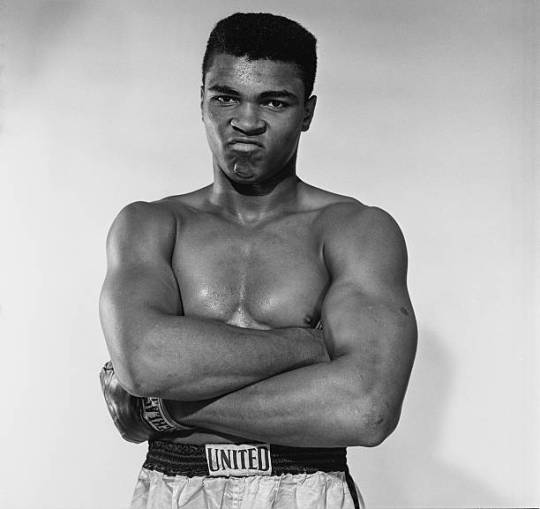
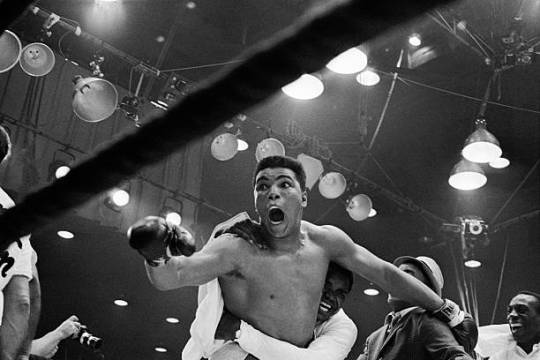

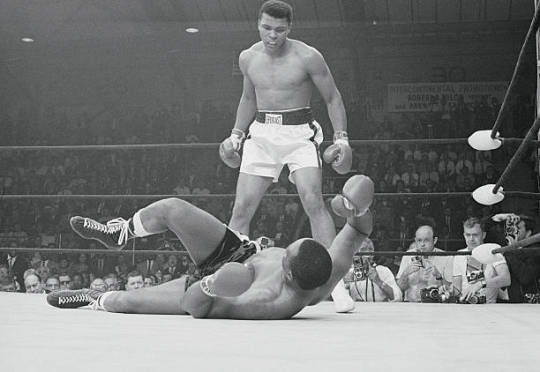
Muhammad Ali (/ɑːˈliː/;[4] born Cassius Marcellus Clay Jr.;[5] January 17, 1942 – June 3, 2016) was an American professional boxer and activist. Nicknamed "The Greatest", he is regarded as one of the most significant sports figures of the 20th century and is often cited as the greatest heavyweight boxer of all time. In 1999, he was named Sportsman of the Century by Sports Illustrated and the Sports Personality of the Century by the BBC.
#muhammad ali#boxing#black excellence#black archives#black literature#black community#black pride#black history#black culture#professional boxing#heavyweight boxing#cassius clay#the greatest#wikipedia
19 notes
·
View notes
Text
Un uomo che osserva il mondo a cinquanta anni allo stesso modo in cui l'ha fatto a venti, ha sprecato trenta anni della sua vita.
Muhammad Ali, nato Cassius Marcellus Clay Jr. (Louisville, 17 gennaio 1942 – Scottsdale, 3 giugno 2016)
5 notes
·
View notes
Photo
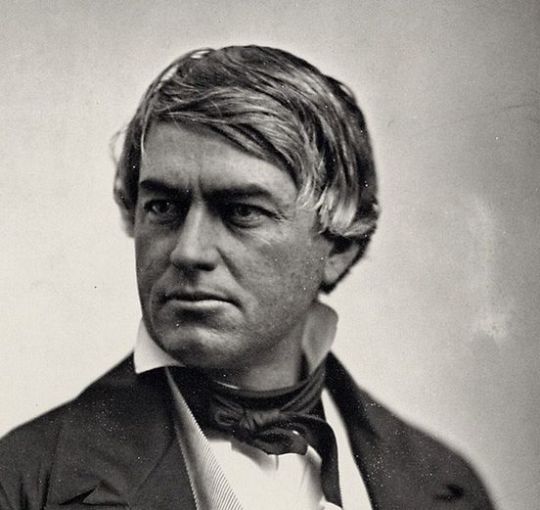
In 1810, Cassius Marcellus Clay was born into one of the wealthiest slave-owning families in Kentucky. However, while studying at Yale, he heard the radical abolitionist William Lloyd Garrison speak. It was a powerful experience that seriously challenged the beliefs Cassius was raised with, and set him on the path to embracing abolition. This prominent son of wealthy slave owners later served three terms in the Kentucky House of Representatives, where his anti-slavery views led to attacks and assassination attempts. The stories of Cassius Clay fighting off assailants sound like the stuff of legend. During a heated public debate, for example, a hired killer fired a bullet into Cassius’ chest… just as Cassius was unsheathing his Bowie knife, which took the hit and saved his life. Despite having just taken the impact of a bullet, Cassius tossed the would-be assassin over an embankment… after slicing off his nose and one of his ears. When six men wielding knives and clubs attacked Cassius at a public meeting, he was stabbed in the back… but was still able to end the fight by gutting one of them and causing the rest to flee. In 1845, Cassius Clay began publishing an anti-slavery newspaper called True American. He installed armored doors at the printing press, as well as two cannons. It didn’t stop a mob of 60 men from storming the press, and forcing the publication to relocate to a free state (even as Cassius himself remained in Kentucky.) A decade and a half later, Cassius Clay would organize the defense unit that protected the White House when the Civil War erupted. He served as minister to Russia during the war, where he helped to secure Russia’s support for the Union. When President Lincoln recalled him from Russia in 1862 to serve as a general in the Union Army, Cassius publicly refused the position unless the President issued a proclamation freeing all slaves under Confederate control… which Lincoln did later that same year.Nine years after Cassius Clay’s death in 1903, a man named Herman Heaton Clay – whose ancestors had been enslaved by the Clay family – named his son after the knife-wielding abolitionist. The Cassius Clay born in 1912 would later name HIS son Cassius Clay, Jr. – better known to the world as Muhammad Ali. This story is part of a project to mobilize White people for racial justice, by providing examples of what White anti-racism has looked like throughout U.S. history. Read the vision statement here:
https://burnett-lynn.medium.com/white-antiracist-history...
14 notes
·
View notes
Text
Cassius Marcellus Clay Jr. · (January 17, 1942 - June 3, 2016)
youtube
Muhammad Ali (Cassius Clay) vs. Zigzy Pietrzykowski - Rome Olympics in 1960
1 note
·
View note
Text
Muhammad Ali: The Champ of Life 🥊
Meet Muhammad Ali, a true legend known for his incredible boxing skills and charismatic personality. Born Cassius Marcellus Clay Jr. on January 17, 1942, in Louisville, Kentucky, Ali’s journey was like a thrilling match, filled with highs and lows.
Life and Achievements 🌟: From a young age, Ali showed promise in the boxing ring. He won an Olympic gold medal in 1960 and went on to become the…
View On WordPress
#BoxingLegend#Champion#CivilRightsActivist#FloatLikeAButterfly#GreatestOfAllTime#Legacy#MuhammadAli#Philosopher#SportsIcon#Inspiration
0 notes
Text
Sem dúvida o maior aprendizado que Muhammad Ali nos deixou foi viver a plenitude da vida com intensidade , autenticidade, positividade, assertividade, encarando tudo que somos, nas consequências positivas e negativas que isto possa desencadear.
Exemplos não faltam deste lutador ou pugilista, como quando adotou a religião mulçumana, quando se recusou a ir lutar no Vietnã, numa guerra insana, aliás todas guerras o são, quando tomou um caminho diferente de Malcolm X e viu que a luta de um e do outro se diferenciava em distintos tipos de ringues, onde em um, reconhecemos o inimigo, sabemos das regras, podemos, se assim o quisermos, " jogar a toalha", dar dois passos atrás para no futuro dar três passos á frente ou adiante, e aprender com seus próprios erros, e não morrer assassinado covardemente.
Nós somos nossos atos,nossas decisões e nossas consequências, a diferença destes ringues é que em um não controlamos " os outros", a prematura vida pode ser o anunciado da prematura morte!
Mas Muhammad Ali não nasceu para ser:
Cassius Marcellus Clay, Jr., nascido em 17 de janeiro de 1942 em Louisville, Kentucky, Estados Unidos.
O mais velho de dois irmãos,cujo nome era o mesmo do pai, Cassius Marcellus Clay, Sr., que fora nomeado em homenagem ao político abolicionista homônimo e era pintor de outdoors.
Sua mãe, Odessa O'Grady Clay, era empregada doméstica. Cassius Sr. era metodista, mas aceitou que Odessa convertesse Cassius Jr. e seu irmão Rudolph "Rudy" Clay (depois renomeado Rahman Ali) à Igreja Batista.
Ele era descendente de escravos afro-americanos do sul estadunidense e também de irlandeses e ingleses.
Cassius Clay Jr. sucumbiu a Muhammad Ali, esse último era muito maior, maior que um simples apelido, que para mídia americana e establishment da época recusavam-se a aceitar e portanto chamá-lo pelo novo nome, seu nome era sua marca,era sua razão espiritual de SER! Uma visão, seguida de valores, valores humanos, que trazia um comportamento agressivo e desconcertante de entrevistadores experientes, seu grito, sua fala era concisa,simples, objetiva e ao mesmo tempo trágica, uma hemorragia que denunciava uma pátria desconstruída, uma pretensa democracia imperialista, racista, liberal, puritana, protestante, cristã, cínica, hipócrita que não vivia a palavra do Messias, mas, na concepção de Muhammad Ali poderia ser outro o Messias; a solução entre Osama e Obama, nem o terrorismo, nem o partidarismo dos Democratas, de todos a direita do Deus Pai, mais a direita, muito mais, a direita dos Republicanos, e o outro mas a direita a esquerda Democratas, mas fundamentalmente todos inebriados, imbricados, subordinados as Emendas, pior que o Conceito, “pior a emenda que o soneto”de uma Constituição escrita pelos homens, logo falta e falha, logo equivocada, logo imperfeita, logo inclusiva em ser exclusiva, sujeita ao poder econômico, a múltiplos interesses hegemônico onde não permite " determinadas posturas antagônicas, ambivalentes, destoantes, e Muhammad Ali nasceu para SER o que ele quisesse SER e ficou banido do mundo do Boxe por longos três anos, uma quase morte para um atleta medalhista olímpico,logo descobriu uma alternativa de receitas, ele foi falar, falar para um público sedento, uma futura chamada Geração X, insólita, questionadora, contestadora, do chamado slogan : " É proibido- proibir", dos múltiplos de 9, dos 27 anos, do Jim Morrinson, da Janis Lyn Joplin, do James Marshall "Jimi" Hendrix, daqueles do Festival Pop de Monterey. Hendrix,do icônico Festival de Woodstock,do "Star Spangled Banner”, numa versão carregada de feedback, com abuso da alavanca de vibrato, distorção e sustain, para procurar evocar ataques aéreos e as explosões dos bombardeamentos de napalm, numa alusão ao conflito no Vietname, e do Festival da Ilha de Wight, entre 1969 e 1970.
Por: Fred Borges
Dedicado a Acelino Freitas, mais conhecido como Popó (Salvador, 21 de setembro de 1975), nosso baiano,pugilista brasileiro, reverenciado internacionalmente no esporte como Super Tetracampeão Mundial Unificado de Boxe, pelas grandes conquistas, recordes e feitos em sua carreira na nobre arte.
Estou assistindo novamente:Good Morning, Vietnam dirigido por Barry Levinson com o saudoso Robin Williams-Vietnã onde 58 mil soldados americanos perderam a vida, onde 1.141.041 de civis pereceram e onde o governo americano nunca aprenderia a lição que esta guerra deixara.
Muhammad era uma gota d' água no oceano de sangue do Estado intervencionista, " grande árbitro internacional"Americano que participaria no século XX e XXI nas guerras de Laos, da invasão da baia dos Porcos,da guerra civil do Camboja, da guerra do Golfo, do Iraque, da Somália, Afeganistão, Iêmen, Líbano, Líbia,tudo contra o terror, num Estado que provoca o terror oficial pela presunção, arrogância, prepotência em governar seus próprios cidadãos dando-lhe ou concedendo-lhe uma liberdade contingenciada,especulativa, neurótica, patológica, contextualizada, customizada ao " American Dream or Nightmare" numa esquizofrenia coletiva predatória de um, dois, três , quatro e cinco "Rambo" de 1982 á 2019.
Muhammad queria a paz, mas no ringue eram outras palavras, estratégias e táticas, inclusive suicidas, quando "em 1974 Ali recuperou o cinturão de campeão mundial, em outro embate histórico: com George Foreman, no então Zaire, hoje República Democrática do Congo.
Ali usou uma tática quase suicida: deixou Foreman bater até ele se cansar. E então liquidou o duelo no oitavo assalto.
Em 1978, ele perdeu, mas logo recuperou novamente o título mundial. Mas já estava apresentando sinais de declínio. Deixou os ringues em 1981 e logo recebeu o diagnóstico: estava com Parkinson.
"Talvez o Parkinson seja um lembrete de Deus sobre o que é importante. Me fez escutar mais do que falar. Agora prestam mais atenção ao que eu digo porque não falo tanto."
Apesar das limitações físicas, viajou pelo mundo em missões humanitárias.
Negociou a libertação de americanos presos por Saddam Hussein no Iraque.
Visitou crianças doentes em Cuba e apresentou truques de mágica para Fidel Castro.
Visitou o líder sul-africano Nelson Mandela, que acabava de sair da prisão. Mandela, que chegou a lutar na juventude, considerava Ali um ídolo.
Em 1996,aconteceu um momento de grande emoção. Não se sabia quem seria o atleta que acenderia a pira olímpica em Atlanta. Quando Ali apareceu, andando com dificuldade, o mundo veio abaixo.
Logo após os atentados terroristas de 11 de setembro de 2001, viajou ao Afeganistão como mensageiro da paz das Nações Unidas.
"Me dói ver muçulmanos envolvidos com ódio e violência. Islã significa paz"
Em 2005, Muhammad Ali recebeu do presidente George W. Bush, na Casa Branca a medalha presidencial da liberdade - a mais importante dada a um civil nos Estados Unidos."
Em evento que ocorreu em 2016, no serviço memorial de Ali em Louisville,seu querido amigo Billy Crystal fez um elogio que exemplifica um mantra nas falas públicas: “conexão, não perfeição”.
A mensagem de Crystal foi autêntica, transmitida com paixão e entusiasmo e, mais do que tudo, conectou-o ao público e ao homem que ele estava homenageando.
Assim transcrevo a sua fala e encerro esse texto com muita emoção, pois apesar de não ter tido o privilégio de conhecer Muhhamed Ali pessoalmente quando estive nos EUA, comungo com as palavras proferidas por Billy Crystal ou como Muhhamed Ali o chamava: " Little brother".
"Thank you, ladies and gentlemen, uh, we’re at the halfway point [crowd laughs]. I was clean-shaven when this started.
Dear Lonnie, family, friends, Mr. President [Clinton], members of the clergy, all of these amazing people here in Louisville. Today, this outpouring of love and respect proves that 35 years after he stopped fighting, he is still the champion of the world.
Last week, when we heard the news, time stopped. There was no war, there were no terrorists, no global catastrophes; the world stopped, took a deep breath and sighed.
Since then my mind has been racing through my relationship with this amazing man, which is now 42 years that I know him. Every moment I can think of is cherished. And while others can tell you of his accomplishments, he wanted me to speak and tell you of some personal moments that we had together.
I met him in 1974, I was just getting started as a stand-up comedian and struggling. But I had one good routine: it was a three-minute conversation between Howard Cosell and Muhammad Ali where I would imitate both of them.
Ali had just defeated George Foreman and regained the heavyweight title. Sport Magazine made him the Man of the Year. Dick Schaap, a wonderful writer and a great man was the editor for Sport, and he hosted a televised dinner, honoring Muhammad Ali. So Dick called my agent looking for a comedian who did some sports material. As fate would have it, that comedian was not available and she wisely said — it’s destiny, man — and she wisely said: “But listen I got this young kid and he does this great imitation of Muhammad Ali and Cosell. He would be perfect for you.” I don’t know why, but Dick said: “O.K., I’ll try him. If he stinks I can cut him out of the show.” I couldn’t believe it. My first time on television and it would be with Ali.
I went to the Plaza Hotel; the event was jammed. I met Mr. Schaap, who would later become a part of my family. And he said: “Well, how should I introduce you? Nobody knows who you are.”
And I said, “Just say I’m one of Ali’s closest and dearest friends.” And my thought was I’ll get right to the microphone, go into my Howard Cosell and I’ll be fine. And then I nervously move into the jammed ballroom and that’s when I saw him for the first time in person. It’s very hard to describe how much he meant to me; you had to live in his time. It’s great to look at clips and it’s amazing to have them, but to live in his time, watching his fights, experiencing the genius of his talent, was absolutely extraordinary. Every one of his fights was an aura of a Super Bowl. He did things nobody would do.
He predicted the round he would knock somebody out in, and the he would do it! He was funny, he was beautiful, the most perfect athlete you ever saw — and those were his own words.
But he was so much more than a fighter as time went on, with Bobby Kennedy gone, Martin Luther King gone, Malcolm X gone, who was there to relate to when Vietnam exploded in our face?
There were millions of young men my age eligible for the draft for a war we didn’t believe in, all of us huddled on the conveyor belt that was rapidly feeding the war machine. But it was Ali who stood up for us by standing up for himself.
And after he was stripped of the title, and the right to fight anywhere in the world, he gave speeches at colleges and on television that totally reached me. He seemed as comfortable talking to kings and queens as the lost and unrequited. He never lost his sense of humor even as he lost everything else. He was always himself: willing to give up everything for what he believed in. And he used amazing rhetoric about the life and plight of black people in our country that resonated strongly in my house.
I grew up in a house that was dedicated to civil rights. My father was a producer of jazz concerts in New York City, and it was one of the first to integrate bands in the ‘40s and ‘50s. Jazz musicians referred to my dad as the Branch Rickey of jazz.
My uncle and my family, Jewish people, produced “Strange Fruit,” Billie Holiday’s classic song describing the lynching of African-Americans in this country. And so I felt him, and now there he was just a few feet from me. I couldn’t stop looking at him and he seemed to, like, glow, and he was like in slow motion, his amazing face smiling and laughing.
I was seated a few seats from him on the dais, and in the room were all the athletes in their individual sports, great ones: Gino Marchetti of the Baltimore Colts, Franco Harris of the Steelers, Archie Griffin who had won the Heisman from Ohio State, literary legends — Neil Simon, George Plimpton — all in a daze fawning over Ali, who then looked at me with an expression that seemed to say, “What is Joel Grey doing here?”
Mr. Schaap introduced me as one of Ali’s closest and dearest friends. Two people clapped: my wife and the agent. I rose, Ali still staring at me. I passed right behind him, got to the podium and went right into the Cosell: “Hello, everyone, Howard Cosell coming to you live from Zaire; some would pronounce it, ‘Zare.’ They’re wrong.” It got big laughs. And then I went into the Ali.
Impersonating Ali: “Everybody’s talking about George Foreman, George Foreman. George Foreman’s ugly, he’s so slow. George was slow, I catch ‘em voo! voo! voo! [swinging fists]. Then I rope-a-dope, I rope-a-dope George and I’m so fast, 33 years of age, but I’m so fast I could turn off the lights and be in my bed before the room gets dark.”
Still impersonating Ali: “However, I’m announcing tonight that I got new religious beliefs. From now on I want to be known as Izzy Yiskowitz. I am now an Orthodox Jew, Izzy Yiskowitz, “cha-im” [I am] the greatest of all time!”
The audience exploded. See, no one had ever done him before. And here I was a white kid from Long Island imitating the greatest of all time, and he was loving it.
When I was done, he gave me this big bearhug and whispered in my ear, “You’re my little brother,” which is what he always called me until the last time that I saw him.
We were always there for each other, and if he needed me for something, I was there. He came to anything I asked him to do. Most memorable: He was an honorary chairman for a dinner at a very important event where I was being honored by the Hebrew University in Jerusalem. He did all of this promotion for it. He came to the dinner. He sat with my family the entire evening. He took photographs with everybody; the most famous Muslim man in the world honoring his Jewish friend.
Because he was there, we raised a great deal of money, and I was able to use it to endow the university in Jerusalem with something that I told him about. And it was something he loved the theory of and it thrives to this day. It’s called Peace Through the Performing Arts. It’s a theater group where Israeli, Arab and Palestinian actors, writers and directors all work together in peace, creating original works of art. And that doesn’t happen without him.
I had so many, so many funny unusual moments with him. I sat next to him at Howard Cosell’s funeral, a very somber day to be sure. Closed casket was on the stage; Muhammad and I were sitting somewhere over there next to each other, and he quietly whispered to me, “Little brother, do you think he’s wearing his hairpiece?”
So I said, “Uh — I don’t think so.”
[As Ali] “Well then how will God recognize him?” So I said, “Champ, once he opens his mouth, God’ll know.” So he started laughing; it was a muffled laugh at first, but then we couldn’t contain ourselves. There we were at a funeral, me and Muhammad Ali, laughing like two little kids who heard something dirty in church, you know? We’re just laughing and laughing.
And then he looked at me and he whispered, “Howard was a good man.”
One time he asked me if I would like to run with him one morning, do road work. I said: “Well that would be amazing. Where do you run?”
As Ali: “Well, I run at this country club, and I run on the golf course early in the morning. It’s very private. Nobody bothers me. We’ll have a great time.”
I said: “Champ, I can’t run there. The club has a reputation for being restricted.”
As Ali: “What does restricted mean?”
“They don’t allow Jews there; they don’t have any Jewish members.”
He was incensed: “I’m a black Muslim and they let me run there. Little brother, I’m never gonna run there again.” And he didn’t.
My favorite memory perhaps was in 1979. He had just retired and there was a retirement party at The Forum, Los Angeles, for Muhammad and 20,000 of his closest friends in Los Angeles. I performed a piece that I had created, the imitation had grown into a live story called “15 Rounds.” I play him from the age of 18 until he’s 36, ready for the rematch with Leon Spinks. I posted it on the internet last week, footage that nobody had ever seen before of me portraying Ali doing his life for him all those years ago in 1979. There were 20,000 people there, but I was doing it only for him. It’s one of my favorite performances that I’ve ever done in my life; I sort of got lost in him. I didin’t even know where I was at the end of the performance.
And suddenly I’m backstage with another heavyweight champion, Richard Pryor. And Pryor is holding on to me, crying, and then I see Ali coming and he’s got a full head of steam and he’s looking only at me, and he nudged Mr. Pryor aside and he whispered in my ear with a big bearhug, “Little brother, you made my life better than it was.”
But didn’t he make all of our lives a little bit better than they were?
That, my friends, is my history with a man and I have labored to come up with a way to describe the legend. He was a tremendous bolt of lightning created by Mother Nature out of thin air, a fantastic combination of power and beauty. We’ve seen still photographs of lightning bolts, ferocious in its strength, magnificent in its elegance. And at the moment of impact it lights up everything around it so you can see everything clearly. Muhammad Ali struck us in the middle of America’s darkest night, in the heart of its most threatening gathering storm. His power toppled the mighty foes and his intense light shined on America and we were able to see clearly: injustice, inequality, poverty, pride, self-realization, courage, laughter, love, joy and religious freedom for all. Ali forced us to take a look at ourselves, this brash young man who thrilled us, angered us, confused and challenged us, ultimately became a silent messenger of peace, who taught us that life is best when you build bridges between people, not walls.
My friends, only once in a thousand years or so do we get to hear a Mozart, or see a Picasso, read a Shakespeare. Ali was one of them, and yet at his heart, he was still a kid from Louisville who ran with the gods and walked with the crippled and smiled at the foolishness of it all. He is gone, but he will never die.
He was my big brother.
Thank you.'
Tradução Livre- Pelo autor e tradutor: Fred Borges:
“Obrigado, senhoras e senhores, estamos na metade do caminho [a multidão ri]. Eu estava barbeado quando isso começou.
Caro Lonnie, família, amigos, Sr. Presidente [Clinton], membros do clero, todas essas pessoas incríveis aqui em Louisville. Hoje, essa demonstração de amor e respeito prova que 35 anos depois de parar de lutar, ele ainda é o campeão mundial.
Na semana passada, quando ouvimos a notícia, o tempo parou. Não houve guerra, não houve terroristas, não houve catástrofes globais; o mundo parou, respirou fundo e suspirou.
Desde então, minha mente tem pensado em meu relacionamento com esse homem incrível, que já faz 42 anos que o conheço. Cada momento em que consigo pensar é apreciado. E embora outros possam contar a vocês sobre suas realizações, ele queria que eu falasse e contasse alguns momentos pessoais que tivemos juntos.
Eu o conheci em 1974, estava apenas começando como comediante stand-up e lutando. Mas eu tinha uma boa rotina: era uma conversa de três minutos entre Howard Cosell e Muhammad Ali, onde eu imitava os dois.
Ali tinha acabado de derrotar George Foreman e reconquistou o título dos pesos pesados. A Sport Magazine elegeu-o o Homem do Ano. Dick Schaap, um escritor maravilhoso e um grande homem, foi o editor do Sport e organizou um jantar televisionado em homenagem a Muhammad Ali. Então Dick ligou para meu agente procurando um comediante que fizesse algum material esportivo. Quis o destino que aquele comediante não estivesse disponível e ela disse sabiamente - é o destino, cara - e ela disse sabiamente: “Mas ouça, eu peguei um garoto e ele faz uma grande imitação de Muhammad Ali e Cosell. Ele seria perfeito para você. Não sei por que, mas Dick disse: “Tudo bem, vou tentar com ele. Se ele fede, posso excluí-lo do show. Eu não pude acreditar. Minha primeira vez na televisão e seria com Ali.
Fui ao Hotel Plaza; o evento estava congestionado. Conheci o Sr. Schaap, que mais tarde se tornaria parte da minha família. E ele disse: “Bem, como devo apresentá-lo? Ninguém sabe quem você é.
E eu disse: “Diga apenas que sou um dos amigos mais próximos e queridos de Ali”. E meu pensamento foi ir direto ao microfone, entrar no meu Howard Cosell e ficarei bem. E então entrei nervosamente no salão de baile lotado e foi quando o vi pessoalmente pela primeira vez. É muito difícil descrever o quanto ele significou para mim; você tinha que viver no tempo dele. É ótimo ver clipes e é incrível tê-los, mas viver na época dele, assistir suas lutas, vivenciar a genialidade de seu talento, foi absolutamente extraordinário. Cada uma de suas lutas tinha uma aura de Super Bowl.
Ele fez coisas que ninguém faria.
Ele previu o round em que nocautearia alguém, e ele o faria! Ele era engraçado, era lindo, o atleta mais perfeito que você já viu - e essas foram suas próprias palavras.
Mas ele foi muito mais do que um lutador com o passar do tempo, com a morte de Bobby Kennedy, a morte de Martin Luther King, a morte de Malcolm X, quem estava lá para se relacionar quando o Vietnã explodiu na nossa cara?
Havia milhões de jovens da minha idade elegíveis para o recrutamento para uma guerra em que não acreditávamos, todos nós amontoados na correia transportadora que alimentava rapidamente a máquina de guerra. Mas foi Ali quem nos defendeu, defendendo-se a si mesmo.
E depois que lhe foi destituído o título e o direito de lutar em qualquer lugar do mundo, ele fez palestras em faculdades e na televisão que me atingiram totalmente. Ele parecia tão confortável conversando com reis e rainhas quanto com os perdidos e não correspondidos. Ele nunca perdeu o senso de humor, mesmo quando perdeu todo o resto. Ele sempre foi ele mesmo: disposto a desistir de tudo por aquilo em que acreditava. E usou uma retórica incrível sobre a vida e a situação dos negros em nosso país que ressoou fortemente em minha casa.
Cresci em uma casa dedicada aos direitos civis. O meu pai era produtor de concertos de jazz em Nova Iorque e foi um dos primeiros a integrar bandas nas décadas de 40 e 50. Os músicos de jazz referiam-se ao meu pai como o Ramo Rickey do jazz.
O meu tio e a minha família, judeus, produziram “Strange Fruit”, a canção clássica de Billie Holiday que descreve o linchamento de afro-americanos neste país. E então eu o senti, e agora ele estava a poucos metros de mim. Eu não conseguia parar de olhar para ele e ele parecia brilhar, e ele estava em câmera lenta, seu rosto incrível sorrindo e rindo.
Eu estava sentado a alguns lugares dele no estrado, e na sala estavam todos os atletas de seus esportes individuais, grandes atletas: Gino Marchetti, do Baltimore Colts, Franco Harris, do Steelers, Archie Griffin, que havia vencido o Heisman em Ohio. Lendas literárias estaduais - Neil Simon, George Plimpton - todos atordoados bajulando Ali, que então olhou para mim com uma expressão que parecia dizer: “O que Joel Gray está fazendo aqui?”
Schaap me apresentou como um dos amigos mais próximos e queridos de Ali. Duas pessoas aplaudiram: minha esposa e o agente. Levantei-me, Ali ainda olhando para mim. Passei logo atrás dele, subi ao pódio e entrei direto no Cosell: “Olá a todos, Howard Cosell vindo até vocês ao vivo do Zaire; alguns diriam ‘Zare’. Eles estão errados.” Deu muitas risadas. E então entrei no Ali.
Personificando Ali: “Todo mundo está falando sobre George Foreman, George Foreman. George Foreman é feio, ele é tão lento. George foi lento, eu os peguei voo! voô! voô! [balançando os punhos]. Então eu enrolo, eu enrolo George e sou tão rápido, 33 anos de idade, mas sou tão rápido que poderia apagar as luzes e estar na minha cama antes que o quarto escurecesse. ”
Ainda se passando por Ali: “No entanto, estou anunciando esta noite que adquiri novas crenças religiosas. De agora em diante quero ser conhecido como Izzy Yiskowitz. Agora sou um judeu ortodoxo, Izzy Yiskowitz, “cha-im” [eu sou] o maior de todos os tempos!”
O público explodiu. Veja, ninguém nunca tinha feito isso antes. E aqui estava eu, um garoto branco de Long Island imitando o maior de todos os tempos, e ele estava adorando.
Quando terminei, ele me deu um grande abraço de urso e sussurrou em meu ouvido: “Você é meu irmão mais novo”, que foi como ele sempre me chamou até a última vez que o vi.
Estávamos sempre presentes um para o outro e se ele precisasse de mim para alguma coisa, eu estava lá. Ele veio para qualquer coisa que eu pedi para ele fazer. O mais memorável: ele foi presidente honorário de um jantar em um evento muito importante, onde fui homenageado pela Universidade Hebraica de Jerusalém. Ele fez toda essa promoção por isso. Ele veio para o jantar. Ele ficou sentado com minha família a noite toda. Ele tirou fotos com todo mundo; o homem muçulmano mais famoso do mundo homenageando seu amigo judeu.
Como ele estava lá, arrecadamos muito dinheiro e pude usá-lo para dotar a universidade em Jerusalém com algo que contei a ele. E era algo que ele amava a teoria e que prospera até hoje. Chama-se Paz através das Artes Cênicas. É um grupo de teatro onde atores, escritores e diretores israelenses, árabes e palestinos trabalham juntos em paz, criando obras de arte originais. E isso não acontece sem ele.
Tive tantos, tantos momentos engraçados e incomuns com ele. Sentei-me ao lado dele no funeral de Howard Cosell, um dia muito sombrio, com certeza. O caixão fechado estava no palco; Muhammad e eu estávamos sentados em algum lugar ali, um ao lado do outro, e ele sussurrou baixinho para mim: “Irmãozinho, você acha que ele está usando sua peruca?”
Então eu disse: “Uh – acho que não”.
[Como Ali] “Bem, então como Deus o reconhecerá?” Então eu disse: “Campeão, quando ele abrir a boca, Deus saberá”. Então ele começou a rir; foi uma risada abafada no início, mas depois não conseguimos nos conter. Lá estávamos nós em um funeral, eu e Muhammad Ali, rindo como duas crianças que ouviram algo sujo na igreja, sabe? Estamos apenas rindo e rindo.
E então ele olhou para mim e sussurrou: “Howard era um bom homem”.
Uma vez ele me perguntou se eu gostaria de correr com ele uma manhã, fazer trabalhos na estrada. Eu disse: “Bem, isso seria incrível. Para onde você corre?
Como Ali: “Bem, eu corro neste clube de campo e corro no campo de golfe de manhã cedo. É muito particular. Ninguém me incomoda. Vamos nos divertir muito.
Eu falei: “Campeão, não posso correr aí. O clube tem a reputação de ser restrito.”
Como Ali: “O que significa restrito?”
“Eles não permitem judeus lá; eles não têm nenhum membro judeu.”
Ele ficou furioso: “Sou um muçulmano negro e eles me deixaram correr para lá. Irmãozinho, nunca mais vou correr para lá. E ele não fez isso.
Minha lembrança favorita talvez seja de 1979. Ele tinha acabado de se aposentar e houve uma festa de aposentadoria no The Forum, em Los Angeles, para Muhammad e 20 mil de seus amigos mais próximos em Los Angeles. Executei uma peça que criei, a imitação se transformou em uma história ao vivo chamada “15 Rounds”. Jogo com ele dos 18 aos 36 anos, pronto para a revanche contra o Leon Spinks. Publiquei na internet na semana passada, uma filmagem que ninguém nunca tinha visto antes, de mim retratando Ali fazendo a vida por ele, tantos anos atrás, em 1979. Havia 20 mil pessoas lá, mas eu estava fazendo isso apenas por ele. É uma das minhas performances favoritas que já fiz na vida; Eu meio que me perdi nele. Eu nem sabia onde estava no final da apresentação.
E de repente estou nos bastidores com outro campeão dos pesos pesados, Richard Pryor. E Pryor está me segurando, chorando, e então eu vejo Ali chegando e ele está com toda a força e está olhando apenas para mim, e ele cutucou o Sr. Pryor de lado e sussurrou em meu ouvido com um grande abraço de urso: “ Irmãozinho, você tornou minha vida melhor do que era.”
Mas ele não tornou todas as nossas vidas um pouco melhores do que eram?
Essa, meus amigos, é a minha história com um homem e tenho trabalhado para encontrar uma maneira de descrever a lenda. Ele era um tremendo raio criado pela Mãe Natureza do nada, uma combinação fantástica de poder e beleza. Vimos fotografias de relâmpagos, ferozes na sua força, magníficos na sua elegância. E no momento do impacto ilumina tudo ao seu redor para que você possa ver tudo com clareza. Muhammad Ali atingiu-nos no meio da noite mais escura da América, no coração da sua tempestade mais ameaçadora. Seu poder derrubou os poderosos inimigos e seu poder,inimigos e a sua luz intensa brilhou sobre a América e pudemos ver claramente: injustiça, desigualdade, pobreza, orgulho, autorrealização, coragem, riso, amor, alegria e liberdade religiosa para todos.
Ali nos forçou a olhar para nós mesmos, esse jovem impetuoso que nos emocionou, irritou, confundiu e nos desafiou, acabou se tornando um mensageiro silencioso da paz, que nos ensinou que a vida é melhor quando você constrói pontes entre as pessoas, não muros.
Meus amigos, apenas uma vez em mil anos ouvimos um Mozart, ou vemos um Picasso, ou lemos um Shakespeare.
Ali era um deles, mas no fundo ainda era um garoto de Louisville que corria com os deuses e andava com os aleijados e sorria da tolice de tudo isso.
Ele se foi, mas nunca morrerá.
Ele era meu irmão mais velho.
Obrigado!"
Obrigado Ali!
Obrigado Popó!
Obrigado por não terem deixado " pedra sobre pedra"!
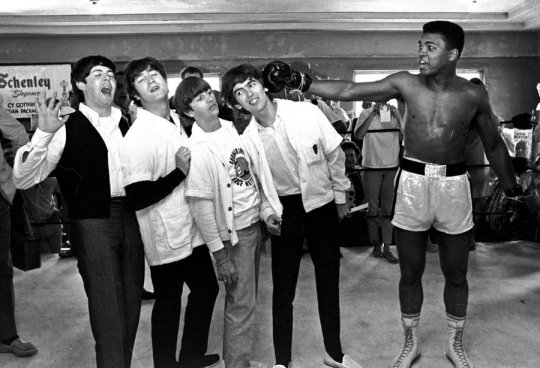
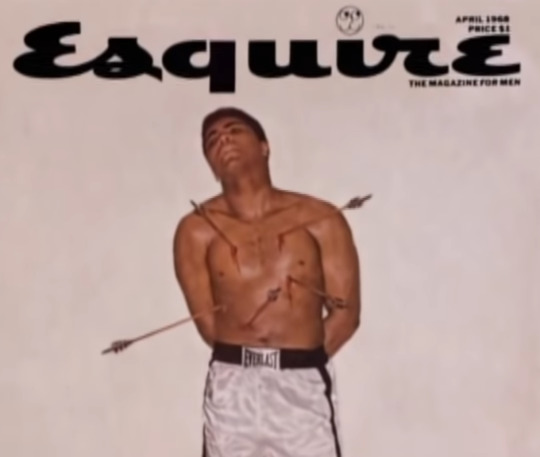
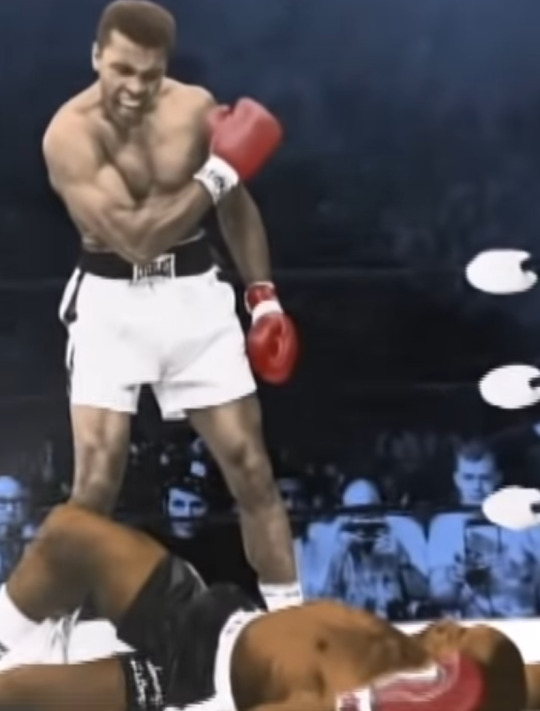
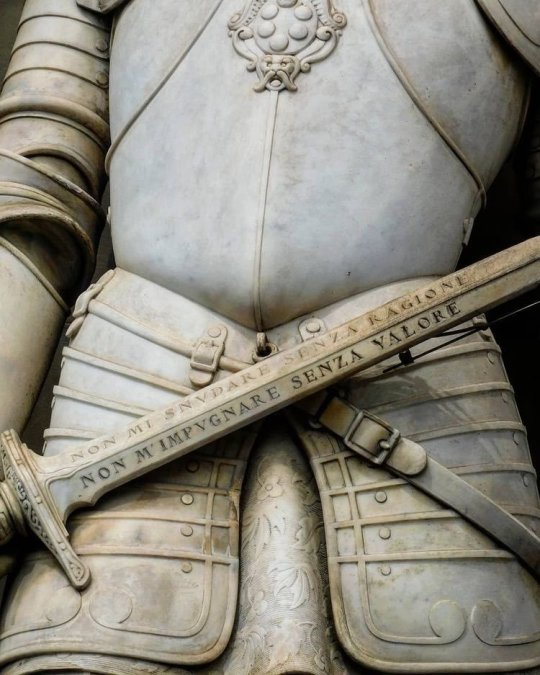
0 notes
Text
Muhammad Ali: The Legend's Journey, Triumphs, and Timeless Wisdom
Introduction
Muhammad Ali, born Cassius Marcellus Clay Jr. on January 17, 1942, transcended the realm of sports, becoming an enduring symbol of resilience, courage, and wisdom. In this blog post, we delve into the extraordinary life of "The Greatest," exploring the challenges he faced, the triumphs that defined him, his best stories, and the legacy he left for the world.
Early Life and Rise:
Hailing from Louisville, Kentucky, Ali discovered his passion for boxing at a young age. His journey took a monumental turn when he won the gold medal in the 1960 Rome Olympics, setting the stage for an illustrious career. However, Ali's path was not without obstacles, and one of the most defining moments came when he refused to be drafted into the military during the Vietnam War. This principled stand cost him his titles and tested his resilience.
Triumph over Adversity:
Ali's exile from boxing didn't mark the end but rather a transformative period. He made a remarkable comeback, showcasing his boxing prowess in iconic matches such as the "Rumble in the Jungle" and the "Thrilla in Manila." These triumphs not only reinstated his titles but solidified his legacy as an athlete of unparalleled skill and determination.
Beyond the Ring:
Ali's life extended beyond boxing gloves and championship belts. His commitment to civil rights and humanitarian causes showcased a depth of character that went beyond sports. One of the most famous quotes attributed to him, "Float like a butterfly, sting like a bee," captures not just his boxing style but his approach to life—nimble yet powerful.
Legacy and Wisdom:
Muhammad Ali's legacy is not only in the records he set but in the wisdom he shared. His philosophy, encapsulated in quotes like "Service to others is the rent you pay for your room here on earth," emphasizes the importance of compassion and giving back. Ali's life teaches us that true greatness extends beyond personal achievements—it lies in the positive impact we have on others.
Advice for Viewers:
For those seeking inspiration, Ali's life offers valuable lessons. Embrace challenges with resilience, stand up for your beliefs, and let your actions contribute positively to the world. Ali's journey is a testament to the fact that setbacks are opportunities for comebacks, and true success is measured not just in victories but in the lives we touch.
Literary Contributions:
To delve deeper into Ali's thoughts and experiences, exploring his autobiography, "The Greatest: My Own Story," is highly recommended. This literary work provides an intimate look into the mind of a legend, offering insights that extend far beyond the boxing ring.
In the grand tapestry of human history, Muhammad Ali's life stands out as a beacon of inspiration. Through challenges, triumphs, and timeless wisdom, he left an indelible mark on the world. As we reflect on his journey, let us carry forward the spirit of resilience, compassion, and greatness that defined "The Greatest."
youtube
0 notes
Text
Taariikh nololeedkii Maxamed Cali Kalaay
Mohammad Ali oo magaciisii asalka ahaa Cassius Marcellus Clay, Jr. wuxuu dhashay Janaayo 17, 1942, wuxuu ku dhashay magaalada Louisville, gobolka Kentucky dalka mareykanka, wuxuu ahaa feeryahan xirfadle Mareykan ah iyo u dhaqdhaqaaqe arrimaha bulshada.
Cali waxa uu ahaa feeryahankii ugu horeeyay ee ku guulaysta horyaalka miisaanka culus ee aduunka saddex jeer oo kala duwan, wuxuu si guul leh u…
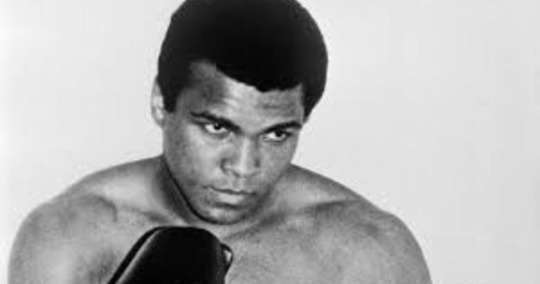
View On WordPress
0 notes
Text
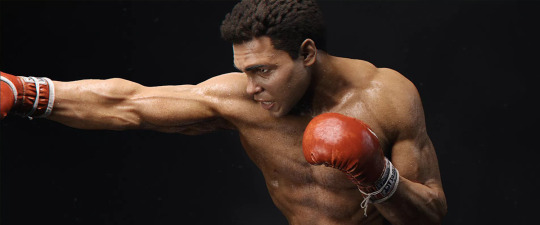
Muhammad Ali, original name Cassius Marcellus Clay, Jr., American professional boxer and social activist. Ali was the first fighter to win the world heavyweight championship on three separate occasions; he successfully defended this title 19 times.
Read to know more.
https://ataax.com/muhammad-ali-the-boxer-facts-biography/
0 notes
Text
Irkçılık ve Ayrımcılıkla Mücadeleyle Geçen Bir Hayat: Muhammed Ali

Spor dünyasında "tüm zamanların en büyüğü" olarak anılan, ömrünü ırkçılık ile ayrımcılıkla mücadeleye adayan unutulmaz boksör ve Müslüman aktivist Muhammed Ali vefatının 7. yılında anılıyor.
ABD'nin Kentucky eyaletinin Louisville kentinde 17 Ocak 1942'de dünyaya gelen Muhammed Ali, İslam dinini seçmeden önce Cassius Marcellus Clay Jr. adını taşıyordu.
Orta sınıf Afro-Amerikan bir ailenin 6 çocuğundan biri olan Ali'nin boksla tanışması, hırsızlık olayıyla başladı. 12 yaşındaki Muhammed Ali, bisikletinin çalınmasının ardından karakola başvurdu. Karakolda, sinirlerini kontrol altına almakta zorlanan Ali'ye boks yapması tavsiyesinde bulunuldu.
Sonraki 4 yıl boyunca boks antrenörü Chuck Bodak tarafından çalıştırılan Muhammed Ali, bu süre zarfında bölgesel birçok turnuvada "Altın Eldiven" kazandı. Ali, amatör olarak çıktığı 100 maçın 95'ini aldı.
Birçok otorite tarafından tüm zamanların en iyi ağır sıklet boks şampiyonu olarak kabul edilen Muhammed Ali, asıl çıkışını 1960 Roma Olimpiyatları'nda hafif ağır sıklette altın madalyaya ulaşarak yaptı. Zaferinin ardından gittiği bir restorana ten rengi nedeniyle alınmamasına kızan Ali, kazandığı altın madalyayı Ohio Nehri'ne fırlattı. ABD'li boksör, emekliye ayrılmasından yıllar sonra olimpiyat ateşini taşıdığı 1996'da Atlanta'da düzenlenen oyunlarda aldığı ödülle, kaybettiği madalyaya yeniden kavuştu.
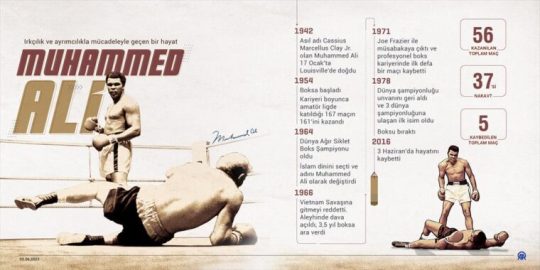
ALTIN KEMERE 4 YILDA UZANDI
İlk profesyonel maçında 29 Ekim 1960'ta Tunney Hunsaker'ı yenen Muhammed Ali, aralarında döneminin önemli boksörleri Tony Esperti, Jim Robinson, Donnie Fleeman, Alonzo Johnson, George Logan, Willi Besmanoff, Lamar Clark, Doug Jones ve Henry Cooper'ın da yer aldığı rakiplerini de mağlup etti.
Profesyonel boks hayatının ilk üç yılı boyunca ringde çıktığı 19 maçın 15'ini nakavtla kazanan Ali, hızlı yükselişiyle boks camiasının da dikkatini çekti.
İLK BÜYÜK ZAFERİ LİSTON'A KARŞI
Müsabakalarda alaycı ifadeler kullanarak psikolojik açıdan rakiplerinin üzerinde baskı kurmasıyla ünlenen Muhammed Ali, dönemin ağır sıklet boks şampiyonu Sonny Liston ile unvan maçına 25 Şubat 1964'te Miami'de çıktı.
Karşılaşma öncesinde düzenlediği basın toplantısında ünlü "Kelebek gibi uçarım, arı gibi sokarım" ifadesini kullanan Ali'nin performansı, kesin favori olarak gösterilen ABD'li Liston karşısında büyük heyecan uyandırdı.
Liston'un 7. rauntta aldığı darbelerin ardından devam edememesi üzerine galip ilan edilen Muhammed Ali, böylece ilk altın kemerine henüz 22 yaşında uzandı.
EN KISA RÖVANŞ
Liston ile 1965'in mayıs ayında rövanş maçına çıkan Muhammed Ali, ilk rauntta yaklaşık 2 dakika içinde rakibini devirerek unvanını korudu.
Muhammed Ali'nin rakibinin devrilmesine yol açan darbesi o kadar hızlıydı ki boks tarihine "hayalet yumruk" olarak geçti.
PROFESYONEL 61 MAÇTA 56 ZAFER
Muhammed Ali, amatör olarak katıldığı 167 maçın 161'ini kazanarak bu alanda bir rekora imza attı.
Profesyonel döneminde yaptığı 61 maçta sadece 5 kez yenilen, olimpiyat ve dünya şampiyonu olan Muhammed Ali, 37'si nakavt olmak üzere 56 maçını kazandı.
22 YAŞINDA MÜSLÜMAN OLDU
Henüz 22 yaşındayken 1964'te Sonny Liston'u yenip en genç dünya ağır sıklet boks şampiyonu olan Muhammed Ali, zaferinin ardından İslam dinini seçti.
Ali'nin İslam dinine ilgisi, Wallace D. Fard Muhammad tarafından ABD'de kurulan "İslam Milleti" adlı siyahi harekete 1964'te katılmasıyla ortaya çıktı.
İlk olarak kendisine "Cassius X" adını veren ünlü boksör, daha sonra ise Muhammed Ali adını seçerek Müslüman olduğunu açıkladı. Ali, dönemin Afro-Amerikan Müslüman siyasi temsilci ve insan hakları savunucusu Malcom X ile yakın ilişkiler kurarken, İslamiyet'in doğru tanınması ve yaygınlaşması amacıyla çeşitli çalışmalarda bulundu.
Siyahilerin birçok temel haktan mahrum olduğu 1960'ların ABD'sinde aynı zamanda Müslüman da olan Muhammed Ali, ABD hükümeti tarafından 1966'da acil koduyla Vietnam Savaşı'na çağrıldı.
"Vietnamlılar bana hiçbir kötülük yapmadılar ki onlarla savaşayım." diyerek Vietnam Savaşı'na gitmeyi reddeden Ali, 5 yıl hapis ve 10 bin dolar para cezasına çarptırıldı, lisansı, pasaportu ve unvanları elinden alındı. Kararı ABD Yüksek Mahkemesinde temyiz eden Ali, 3,5 yıl boyunca bokstan uzak kaldı ve dava süresince ciddi maddi sıkıntı içine girdi. 1971'de Yüksek Mahkeme'deki temyiz davasını kazandı.
Muhammed Ali, 1972 ve 1988 yıllarında iki kez Hacca gitti.
ÜÇ DÜNYA ŞAMPİYONLUĞUNA ULAŞAN İLK İSİM
1971'de Joe Frazier ile "asrın maçı" olarak adlandırılan müsabakaya çıkan Muhammed Ali, profesyonel boks kariyerinde ilk defa bir maçı kaybetti.
Ali, aynı yıl bir kez daha karşılaştığı Joe Fraizer'ı bu sefer yenerek dünya ağır sıklet boks şampiyonu unvanını geri aldı. Muhammed Ali, 1977'de Leon Spinks'e yenildi ancak bir yıl sonra rakibini yenerek dünya şampiyonluğunu 3 kez elde eden ilk boksör olarak tarihe geçti.
Unutulmaz boksör, 1978'de boksu bıraktığında dünya şampiyonu unvanına sahipti.
1984 yılında Parkinson hastalığına yakalanmasına rağmen bunu gizleyip büyük para karşılığı iki maç daha yapan Muhammed Ali, bunları kaybetti.
BOKSTAN SONRAKİ YAŞAMI
1984 yılında, dönemin ABD Başkanı Ronald Reagan'ın yeniden seçilebilmesi için kendisine destek verdiğini açıkladı.
1991 yılında Körfez Savaşı sırasında Irak'a gitti ve Amerikalı rehinelerin serbest bırakılmasını müzakere etmek amacıyla Saddam Hüseyin ile bir araya geldi.
17 Kasım 2002'de, "Birleşmiş Milletler (BM) Barış Elçisi" olarak Afganistan'a gitti. BM özel konuğu olarak üç günlük bir iyi niyet misyonu kapsamında Kabil'de bulundu.
27 Temmuz 2012 tarihinde ise Londra'da, 2012 Yaz Olimpiyatları açılış töreninde olimpiyat bayrağını taşıdı. Parkinson hastalığından dolayı stadyumda bayrağı taşıyamayacak hale gelince eşi Lonnie, ayakta durmasına yardımcı oldu.
1996 Atlanta Olimpiyatları'nda da olimpiyat ateşini yaktı ve aynı olimpiyatlarda, 1960 yılında kazandığı ve nehre attığı altın madalyası düzenlenen bir törenle kendisine tekrar verildi.
Parkinson hastalığı yüzünden uzun süre Michigan'daki çiftliğinde gözlerden uzak yaşamayı tercih eden ünlü boksör, ringlerde 20 yıldır ağzından düşürmediği "Bütün zamanların en iyisiyim" lafını ispatlayarak bir efsane olarak tarihe geçti.
Farklı dönemlerde dört evlilik yapan Ali'nin toplam 9 çocuğu oldu.
Ünlü boksörün hayatı, Hollywood tarafından 2001 yılında beyaz perdeye de uyarlandı. ABD'li ünlü aktör Will Smith'in başrolünde oynadığı "Ali" adlı yapım, büyük ses getirmişti.
Uzun süre Parkinson hastalığı ile mücadele eden Muhammed Ali, solunum yolu rahatsızlığı nedeniyle tedavi gördüğü Arizona'nın Phoenix kentindeki bir hastanede 3 Haziran 2016 günü hayata gözlerini yumdu.
Read the full article
0 notes
Photo
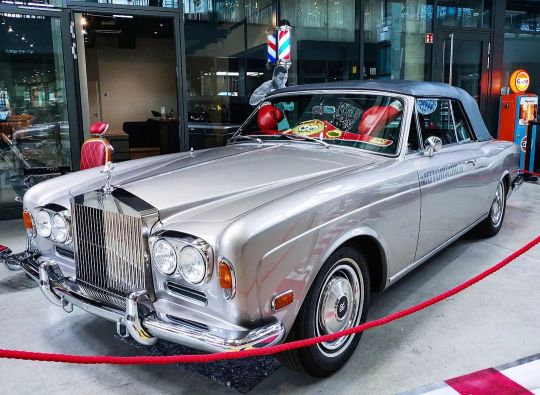
Muhammad Ali's 1970 Rolls-Royce Silver Shadow Mulliner Park Ward convertible in Motorworld München, Germany Muhammad Ali, originally named Cassius Marcellus Clay, jr. was an American professional boxer, social activist, and philanthropist born on January 17, 1942, in Louisville, Kentucky. Muhammad Ali was the first boxer in history to win the world heavyweight championship on three separate occasions and unrelentingly defended his title 19 times. He also won an Olympic Gold medal at the 1960 Olympics, securing his spot among the top world boxing legends and athletes in history. During his boxing years, Ali was known for the ownership of some stunning luxury automobiles. Info: hotcars.com #rollsroycesilvershadow #motorworld #rolls #rollsroyce #classiccars #classiccar #rollsroycecabrio #classicrolls #classicrollsroyce #rrec #luxuryvehicle #mulliner #cassiusclay #luxurycars #oldtimers #luxury #muhammadali #rollsroycemotorcars #cabrio #carsofinstagram #carphotography #travel #vintagecar #instacars #carpassion #carlifestyle #motorworldmünchen #convertible #traveling #travelgrams (at Motorworld) https://www.instagram.com/p/CpDzsrIoSwn/?igshid=NGJjMDIxMWI=
#rollsroycesilvershadow#motorworld#rolls#rollsroyce#classiccars#classiccar#rollsroycecabrio#classicrolls#classicrollsroyce#rrec#luxuryvehicle#mulliner#cassiusclay#luxurycars#oldtimers#luxury#muhammadali#rollsroycemotorcars#cabrio#carsofinstagram#carphotography#travel#vintagecar#instacars#carpassion#carlifestyle#motorworldmünchen#convertible#traveling#travelgrams
1 note
·
View note
Text
Muhammad Ali was a boxer in the 90s was born Cassius Marcellus Clay Jr January 17, 1942 – June 3, 2016) was an American professional boxer and activist. Nicknamed "The Greatest", he is regarded as one of the most significant sports figures of the 20th century and is frequently ranked as the greatest heavyweight boxer of all time.[6][7][8] In 1999, he was named Sportsman of the Century by Sports Illustrated and the Sports Personality of the Century by the BBC.
Born and raised in Louisville, Kentucky, he began training as an amateur boxer at age 12. At 18, he won a gold medal in the light heavyweight division at the 1960 Summer Olympics and turned professional later that year. He became a Muslim after 1961. He won the world heavyweight championship, defeating Sonny Liston in a major upset on February 25, 1964, at age 22. During that year, he denounced his birth name as a "slave name" and formally changed his name to Muhammad Ali. In 1966, Ali refused to be drafted into the military owing to his religious beliefs and ethical opposition to the Vietnam War[9][10] and was found guilty of draft evasion and stripped of his boxing titles. He stayed out of prison while appealing the decision to the Supreme Court, where his conviction was overturned in 1971. He did not fight for nearly four years and lost a period of peak performance as an athlete.[11] Ali's actions as a conscientious objector to the Vietnam War made him an icon for the larger counterculture of the 1960s generation,[12][13] and he was a very high-profile figure of racial pride for African Americans during the civil rights movement and throughout his career.[9] As a Muslim, Ali was initially affiliated with Elijah Muhammad's Nation of Islam (NOI). He later disavowed the NOI, adhering to Sunni Islam.
He fought in several historic boxing matches, including his highly publicized fights with Sonny Liston, Joe Frazier (including the Fight of the Century, the biggest boxing event up until then),[14] the Thrilla in Manila, and his fight with George Foreman in The Rumble in the Jungle.[15][16] Ali thrived in the spotlight at a time when many boxers let their managers do the talking, and he became renowned for his provocative and outlandish persona.[17][18][19] He was famous for trash-talking, often free-styled with rhyme schemes and spoken word poetry incorporating elements of hip hop.[20][21][22] He often predicted in which round he would knock out his opponent.
Outside boxing, Ali attained success as a spoken word artist, releasing two studio albums: I Am the Greatest! (1963) and The Adventures of Ali and His Gang vs. Mr. Tooth Decay (1976). Both albums received Grammy Award nominations.[22] He also featured as an actor and writer, releasing two autobiographies. Ali retired from boxing in 1981 and focused on religion, philanthropy and activism. In 1984, he made public his diagnosis of Parkinson's syndrome, which some reports attributed to boxing-related injuries,[23] though he and his specialist physicians disputed this.[24] He remained an active public figure globally, but in his later years made fewer public appearances as his condition worsened, and he was cared for by his family.
0 notes